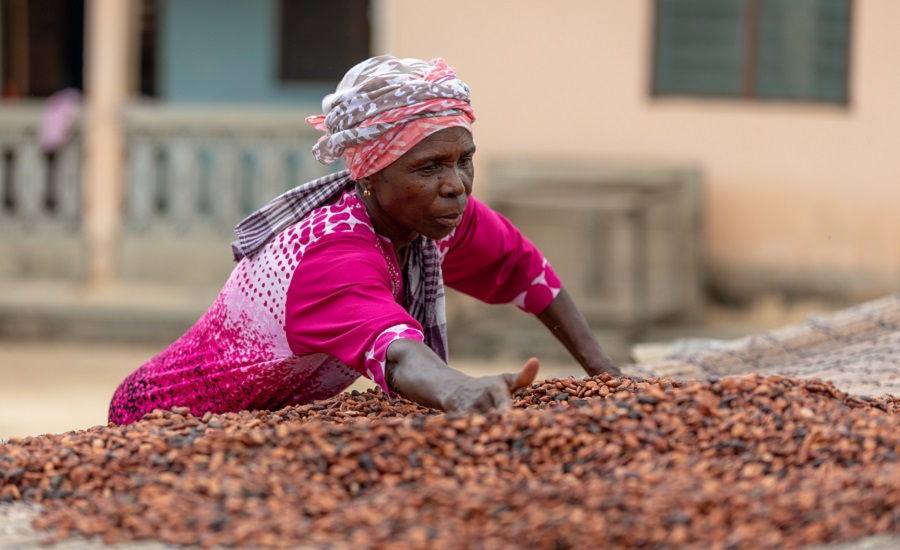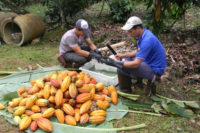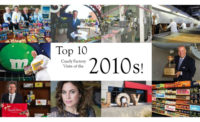Cocoa farmers play a vital role in snack and bakery production because all the chocolate in the world comes from the beans that they grow. However, despite the importance of their work, these farmers have not always been treated or compensated adequately for their work, leaving them living at or below poverty levels and dealing unassisted with rough weather, insects attacking their crops, political upheaval, and other challenges threatening their livelihood.
In recent years, industry players like Cargill have launched efforts to help elevate cocoa farmers. In 2012, the supplier launched the Cargill Cocoa Promise, a program to help cocoa farmers and the communities they operate in grow cocoa more sustainably and to reach better living standards. Since its founding more than a decade ago, the program reportedly has helped about 250,000 farmers, touched six different cocoa-producing countries, and kicked off more than 100 collaborative projects intended to address the myriad environmental, social, and economic challenges cocoa producers face.
To learn more about the Cocoa Promise and its mission to help cocoa farmers around the world, Snack Food & Wholesale Bakery recently connected with Kate Clancy, group sustainability director, Cargill Cocoa and Chocolate.
Jenni Spinner: Why is cocoa sustainability important?
Kate Clancy: Cocoa is a vulnerable crop. Poverty, weather conditions, pest and disease, land competition, farming standards, and political factors can all influence the quality and quantity of supply. Many smallholder farming households struggle to make a living income from cocoa and have limited access to the infrastructure, training, and finance they need to invest in their farms and run a successful business, on and off farm. Supporting farmers, their families, and the communities where they live is therefore an essential precondition for securing the future of cocoa and helps build prosperity where cocoa is grown.
Further supporting our work, we see increasing consumer demand for sustainably-sourced products. Consumers all over the world want to know that the products they purchase are produced in a sustainable manner, and our customers look to us to help them meet this demand.
JS: Going a bit deeper, why is environmental sustainability important in cocoa growing, processing, production, etc?
KC: At Cargill, our purpose is to nourish the world in a safe, responsible, and sustainable way. That means environmental protection is a priority across all our supply chains, cocoa included. As the world faces extraordinary challenges—from climate change to food insecurity—delivering on our purpose is more critical than ever before.
Within the cocoa industry, we are ensuring deforestation is eradicated, helping cocoa farmers adopt sustainable practices, such as increasing on-farm tree cover, with the aim of fostering sustainable landscapes that balance cocoa production and forest conservation. Environmental efficiencies are also evident in our cocoa-processing facilities, many of which are powered by renewable wind and solar energy.
Looking further ahead, as we anticipate the future challenges posed by climate change, we’ve partnered with vertical farming pioneer AeroFarms on a multi-year research project aimed at improving cocoa bean yields and developing more climate-resilient farming practices.
JS: Then, why is social sustainability also important?
KC: All dimensions of sustainability are intertwined. If we’re going to create a more resilient cocoa sector, we must address all three areas: environmental, economic, and social. Take child protection, which fits under the social dimension. We’re involved in multiple collaborations aimed at improving access to quality education—from helping families secure birth certificates so their children can attend school, supplying school materials and equipment, to rehabilitating and expanding school infrastructure, to supporting nutrition programs in households and at schools.
At the same time, we’re providing adults in their household—both women and men—with access to functional and technical trainings that support entrepreneurship and enable additional income generation. Complex issues like child labor require this type of multi-pronged approach to prevent and/or remediate vulnerability and require partnership with families, communities, governments, NGOs, and other stakeholders to realize transformational change.
JS: What can you tell us about the farmers and farmer organizations, NGOs, governments, and other organizations Cargill partners with?
KC: We realized early on that building a more resilient cocoa sector would require collaboration with stakeholders across the cocoa supply chain, so we worked to connect cocoa farmers, their households, and farming organizations with government agencies, technical experts in NGOs, customers, and others. Through these partnerships, we’ve collaborated to build more resilient farming businesses and stronger rural communities, while protecting natural resources.
We’re currently partnering with more than 60 organizations. Some of these collaborations pre-date the Cargill Cocoa Promise, including our work with CARE, which dates back to 2008 in Ghana and 2010 in Côte d’Ivoire. Today, this far-reaching partnership supports initiatives aimed at child protection, women’s empowerment, income diversification, improved nutrition, climate resilience, and more.
Our Coop Academy program, conducted in partnership with the International Finance Corporation, TechnoServe, and others, illustrates another way we’re collaborating to empower farmer organizations and support rural development across cocoa-growing regions in West Africa. Initiated by Cargill in 2013, this program provides cocoa-cooperative leaders with in-depth training in business management and sustainability competencies. The Coop Academy also supports women entrepreneurs, helping them set up women’s groups, and micro-credit services such as VSLAs, and learn skills to develop additional income-generating activities. It is a fundamental pillar to our sustainability efforts as it truly empowers local leaders.
Other collaborations are more recent, such as our work with PUR Projet, which supports forest protection. Together, we’re introducing agroforestry as a way to support on-farm restoration and forest protection near essential conservation areas, while also diversifying farm incomes through fruit and timber sales.
JS: Congratulations on passing the 10-year mark with this program—could you please talk about some of the lessons you’ve learned in the decade since the Cocoa Promise program was launched, and how those lessons might shape the next 10 years?
KC: Thank you! We’re proud of the work we’ve done and excited for what lies ahead. We’ve made significant gains, especially as we’ve learned to look beyond symptoms and build programs that systemically address the root causes of some of the biggest sustainable development challenges facing the cocoa sector and the world. But, while there are reasons to celebrate, we also know we must continue to do more. Progress hasn’t always been as fast as we’d like it to see it, and sustainability issues persist across cocoa communities.
As we look ahead to the next 10 years, we’ll continue to engage with all partners to advance solutions for emerging and cross-cutting issues like gender equity and living income, knowing our work to address these challenges also has implications for forest protection, climate adaptation, improved household resilience, child protection and more. While the bar should and will continue to rise, we’ll be working side-by-side with cocoa farming households and other partners, leveraging our collective strengths to build a thriving cocoa sector for generations to come.
JS: Then, please talk about how snack and bakery producers might apply the programs and lessons from the Cargill Cocoa Promise in their own productions.
KC: Because we believe investments in the first mile create opportunities in the last mile, we’ve developed a portfolio of products and services that enable our customers to be part of this work. Through Cargill’s Sustainability Solutions, customers can purchase cocoa sourced directly from our known sources and according to important sustainability criteria. Going one step further, customers may choose to invest in a high-impact project linked to a key challenge in the cocoa sector. As a final step, we connect customers to farming communities through our CocoaWise digital customer portal, which provides unprecedented transparency with traceability and sustainability information, and stories about the lives this work touches.
JS: Do you have anything else to add?
KC: There’s an African proverb that says it well: “If you want to go fast, go alone. If you want to go far, go together.” Many individuals use this when speaking about sustainability because it represents what we have learned. So many of the issues facing the cocoa sector are far beyond Cargill’s direct control, but we know that by working together with cocoa farmers, cocoa-growing organizations, local communities, governments, technical experts at NGOs, our customers, and other stakeholders, we can bring transformational change to the sector and the lives of those that depend on it.





